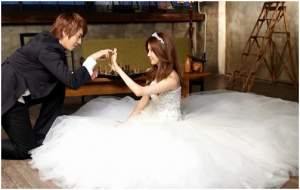Learning Korean from Korean T.V show
We got married! 우리 결혼했어요 (우결)
We Got Married (우리 결혼했어요) is one of the popular variety shows on MBC. The show is directed for the purpose of how couples of Korean celebrities could show what life would be like if they were married. Each week, couples are assigned missions to complete, with candid interviews of the participants to reveal their thoughts and feelings. The variety show tells you how young couples would solve the troubles of their love and marriage throughout the interesting episodes.
The show, 우리 결혼했어요, let us think of some interesting questions which everyone would have ever thought about once such as “If I were ~ or If we are” While you watch the show, you may be confused what is real or imaginary. Now, the season 4 is still going on since the first season started in 2008. In the season 4, you can enjoy exciting episodes between new couples, Jullien Kang & 윤세아, 황광희 & 한선화 (one of members of Secret), 이준 & 오연서. Nowadays, 황광희, one of the member of ZE:A, is a budding rookie in many reality variety shows.
Shall we learn Korean past tense from the show title?
The sentence, 우리 결혼했어요, means “We got married”. It is a past tense. How to say something of what you did in Korean?
Before you move on to the next step, you need to know the structure of the Korean verbs first. All Korean verbs end in –다 such as 보-다(to see, watch), 먹-다(to eat), and 공부하-다(to study). Korean verbs are divided into two parts, stem part and ending part. The ending part is always –다. In the word, 공부하다, 공부하 is a stem part and –다 is an ending part.
Korean past tense can be made with –았어요/-었어요/-했어요. Depending on the vowel in the last syllable in each verb stem, -았어요, -었어요 or –했어요 should be attached to the stem part. At this time, -다 ending part is deleted.
If the last syllable in any verb stem has a ‘ㅏ’ or ‘ㅗ’ vowel, -았어요 is added. For example, you can separate the verb 보다 (see, watch) into 보 and 다. 보-(stem part) has a ‘ㅗ’ vowel, so –았어요 is added. Then without –다, 보 is combined with –았어요. So it becomes 보-았어요. It means ‘saw’.
To another verbs has other vowels excepting ‘ㅏ’and ‘ㅗ’ in the last syllable in the stem, -었어요 is combined. For example, 먹-다 which means eat, has a ‘ㅓ’vowel in its stem. So the stem part can put together with –었어요. Finally, 먹 and –었어요 become 먹었어요 which means ate.
All verbs ending in하다 become –했어요. For example, 공부하다(study) becomes 공부했어요 (studied). As you seen the title of ‘우리 결혼했어요’, 결혼했어요 comes from the basic form ‘결혼하다 (get married)’. You can use the expression ‘-했어요’ in many ways. It means “I did something”.
저는 한국어 공부했어요. (I studied Korean/ Jeoneun hangugeo gongbuhaetsseoyo)
저는 비빔밥 먹었어요. (I ate 비빔밥/ Jeoneun bibimbop meogeotsseoyo)
저는 영화 보았어요. (I watched a movie/ Jeoneun yeounghwa boatsseoyo).
Question form is simple.
“어제 뭐 했어요?” It means “What did you do yesterday?” 어제[eoje] means “yesterday”.
You can make your own answers. 저는 어제 한국어 공부했어요. Instead of 한국어, you can put anything.
저는 (math) 공부했어요. 저는 (불고기) 먹었어요. In the bracket, you may put anything.
Ok. Just enjoy learning Korean and try to use what you learn. Thank you.
Korean teacher, Sarah Yong.




Latest Comments